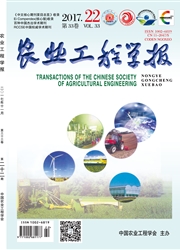

 中文摘要:
中文摘要:
为了建立面域三维土壤盐分信息精准解译与表征技术方法,该研究以反距离权重空间数据插值方法结合电磁感应式表观土壤电导率快速测定技术为基础,成功构建出典型干旱区土壤盐分分层精确解译模型,对研究区土壤盐分进行了精度解析与评估,以三维图形方式直观揭示了土壤盐分空间分布特征.研究区不同区位土壤盐分呈现出不同的剖面分布类型特征,研究区主体土壤属于中度以上盐渍化.该研究将为土壤盐分三维空间分布特征解析与评估提供可靠技术方法.
 英文摘要:
英文摘要:
In order to clarify the three-dimensional spatial pattern of soil salinity on a regional scale, the Inverse Distance Weighting (IDW) method was used, combining the electromagnetic induction technique in this study. Apparent electrical conductivities were measured by electromagnetic induction, and thus layered salinity interpreting models with reasonable accuracy were established. The models showed a significant correlation between soil salt contents of different layers and apparent soil conductivities measured by electromagnetic induction, while soil moisture and clay content also significantly correlated with the apparent soil electrical conductivities. According to the classical statistical results, the minimum values (0.742-0.821 g/kg) of soil salt contents in different soil layers were substantially equal, but the maximum values differed from 5.943 to 9.810 g/kg, showing a significantly increased regularity with increasing depth, and the average values varied from 2.3 to 3.0 g/kg. Soil salinities of every layer belonged to moderate variability while the coefficients of variation increased with the increase of soil depth. Three-dimensional spatial distribution of soil salinity was characterized by IDW. Regional soil salinity spatial distribution characteristics were intuitively revealed by three-dimensional graphics. Profile soil salinity varied greatly with depth, showing different types of profile distribution characteristics in different locations across the study area. Soil of the main study area registered moderate or severe degree of salinization, which showed that there were more common and severe soil salinization in this study area. The 3D inverse distance weighting method combined apparent soil conductivity rapid determination by means of electromagnetic induction, and could achieve exact analytical evaluation of the three-dimensional spatial variability of regional soil salinity. This study and the results could provide a reliable technical method for interpretation and evaluation of regiona
 同期刊论文项目
同期刊论文项目
 同项目期刊论文
同项目期刊论文
 Multiple time scale characteristics of rainfall and its impact on soil salinization in the typical e
Multiple time scale characteristics of rainfall and its impact on soil salinization in the typical e A novel discussion on two long-term forecast mechanisms for hydro-meteorological signals using hybri
A novel discussion on two long-term forecast mechanisms for hydro-meteorological signals using hybri Discrimination of dopamine from ascorbic acid and uric acid on thioglycolic acid modified gold elect
Discrimination of dopamine from ascorbic acid and uric acid on thioglycolic acid modified gold elect Effects of Irrigation Management on Winter wheat-summer Maize Rotation System in moderately Saline S
Effects of Irrigation Management on Winter wheat-summer Maize Rotation System in moderately Saline S 期刊信息
期刊信息
